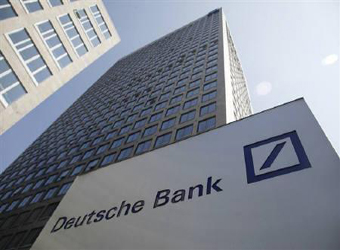Embattled German lender Deutsche Bank incurred a net loss of 1.9 billion euros ($2.05 billion) for its fourth quarter, missing analyst expectations, but reported improved results for the whole of 2016 in what has been a trying year for the bank.
Deutsche Bank’s full-year net loss was 1.4 billion euros, versus a net loss of 6.8 billion euros in 2015, with chief executive John Cryan saying that the bank “finished 2016 with pleasingly strong capital and liquidity ratios.” However, shares of the bank sunk 3 percent as the European session opened Thursday, with the fourth-quarter results disappointing investors. Shares extended losses by 9.00 a.m. London time to trade 6 percent lower.
The earnings release showed that charges totaled 5.8 billion euros last year, including 2.9 billion euros in the fourth quarter alone. It said these were related to impairments of goodwill, the sale of its Abbey life insurance business, restructuring and de-risking, and litigation costs which totaled 1.6 billion euros in the last quarter of 2016.
It said liquidity reserves were 218 billion euros at year-end, after standing at 200 billion euros at the end of the third quarter 2016. The bank’s core capital ratio – a gauge of the bank’s capital buffers – was 11.9 percent at the end of 2016, compared to 11.1 percent in the third quarter.
Wild ride in 2016
Shares of Deutsche Bank experienced a wild ride during 2016 after a proposed $14 billion settlement with the U.S. Department of Justice that related to the selling of residential mortgage-backed securities (RMBS) was leaked.
This raised concerns on its capital position, but the German banking giant insisted that it had a “comfortable” cushion at the time. This didn’t stop a whole bunch of price fluctuations in the company’s bonds and the cost of insuring its debt. There were reports of a potential state bailout at the time, but Cryan told CNBC last month that he, or any member of the board, never discussed the idea with the German government.
The German lender came under pressure from aggressive short-selling, notably from some large hedge funds. The bank announced further job cuts in Germany during that period and it announced it was offloading its British insurance business. Initial worries about Deutsche Bank actually surfaced earlier that year, with investors detailing concerns over its exposure to the energy sector and a possible cash crunch.
In the earnings report Thursday, it said that the downsizing or exiting of a number of businesses, and “negative news flow around the DOJ RMBS settlement in October 2016 adversely impacted revenues.”
In January this year, the official announcement came that it would pay $7.2 billion for misleading investors. The U.S. Justice Department stated that this “agreement represents the single largest RMBS resolution for the conduct of a single entity.”
“This resolution holds Deutsche Bank accountable for its illegal conduct and irresponsible lending practices, which caused serious and lasting damage to investors and the American public,” said Attorney General Loretta E. Lynch in the release.
“Deutsche Bank did not merely mislead investors: It contributed directly to an international financial crisis.”
‘Mirror trading’
The British regulator Financial Conduct Authority (FCA) said Tuesday morning that Deutsche Bank exposed the U.K.’s financial system to the risks of financial crime between January 2012 and December 2015. According to the FCA, Deutsche Bank failed “to properly oversee the formation of new customer relationships and the booking of global business in the U.K.” and ordered it to pay the £163 million charge ($203.83 million) – the largest penalty ever applied by the British regulator.
This fine came after the bank announced Monday it would pay $425 million to a banking regulator in New York over a similar “mirror trading” scheme that transferred $10 billion out of Russia.
Source: CNBC


